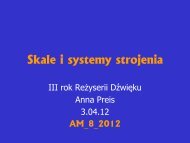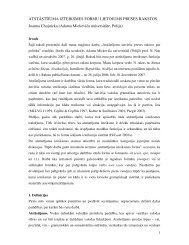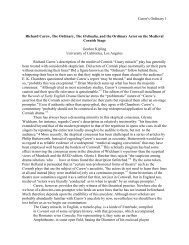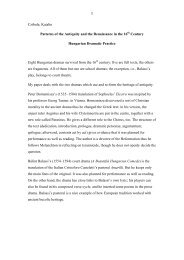Amir Weiner Getting to Know You
Amir Weiner Getting to Know You
Amir Weiner Getting to Know You
You also want an ePaper? Increase the reach of your titles
YUMPU automatically turns print PDFs into web optimized ePapers that Google loves.
GETTING TO KNOW YOU 41<br />
were institutionalized in the postwar era. Throughout the first half of 1945, the<br />
NKVD plenipotentiaries at the front—some of whom presided over the 1940–<br />
41 cleansing operation in eastern Poland and the Baltic states—were engaged<br />
in a private competition as <strong>to</strong> who would carry out and report <strong>to</strong> Moscow the<br />
largest number of arrests and executions. 116 With Stalin breathing down his<br />
neck during the postwar collectivization and anti-nationalist campaigns (“I<br />
warn you that if you persist in taking such an unstate-like and un-Bolshevik<br />
path in the future, this business may end badly”), 117 Khrushchev bluntly<br />
altered lower estimates of anti-Soviet guerrillas fatalities <strong>to</strong> significantly larger<br />
numbers, publicly lamented the “liberalism displayed by the NKVD and<br />
NKGB in 1941,” and the current “nonsensical, very, very low number of<br />
[rebel] families deported,” exhorted his subordinates <strong>to</strong> “conduct deportation<br />
<strong>to</strong> Siberia in daylight,” and instructed them <strong>to</strong> “arrest even the least important<br />
ones. Some must be tried, others can be hanged, the rest deported. For one<br />
of ours, we will take a hundred of them,” and “<strong>You</strong> haven’t used enough<br />
violence! When you seize a village where they killed two women, you must<br />
destroy the entire village.” 118 Collateral ruled the day.<br />
In all likelihood, this was not a modus operandi that would entice<br />
mimicking by other intelligence services. It would be a mistake, however, <strong>to</strong><br />
evaluate the surveillance system on a professional basis alone. True, opting for<br />
collective targeting ran counter <strong>to</strong> the professional ethos <strong>to</strong> which the security<br />
services aspired, and it further embittered large segments of society and<br />
violated the official stand of individually based justice following the “Great<br />
Break.” But in the Stalinist pressure cooker and quota system, indiscriminate<br />
targeting was not simply the only method of choice. It was also highly<br />
effective in subjugating a restless society—a dividend that outweighed all<br />
other deficiencies. Imprecision was a reflection of both the system and its<br />
ever-suspicious leader, who blocked all attempts at reform and an affordable<br />
price tag. Shifting course <strong>to</strong> a more accurate gathering of information and<br />
individual targeting was conditioned both by the death of the dicta<strong>to</strong>r and by<br />
successors with a different regard for their society.<br />
Conclusion<br />
The fall of 1956 may have marked a low point for the security services, but<br />
the KGB did not betray a sense of despair or resignation. Nor did it resort<br />
<strong>to</strong> its old methods. With the help of Komsomol activists, interrogations, and<br />
116 Nikita Petrov, Pervyi predsedatel´ KGB: Ivan Serov (Moscow: Materik, 2005), 39–40.<br />
117 RGASPI f. 17, op. 167, d. 72, l. 126.<br />
118 Tomilina, Nikita Khrushchev, 1:86–87, 90, 118; William Taubman, Khrushchev: The Man<br />
and His Era (New York: Nor<strong>to</strong>n, 2003), 195–96.

















